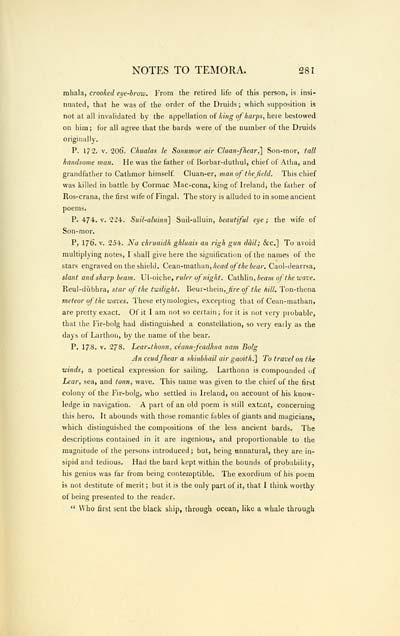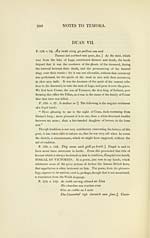J. F. Campbell Collection > Poems of Ossian > Volume 3
(293)
Download files
Complete book:
Individual page:
Thumbnail gallery: Grid view | List view

NOTES TO TEMORA. 281
mhala, crooAff/ ej/e-è)oai. From the retired life of this person, is insi-
nuated, that he was of the order of the Druids ; which supposition is
not at ail invalidated by the appellation of iì'ng o/'Aarpi, heie bestowed
on him; for all agree that the bards were of the number of the Druids
origiiially.
P. 172. V. 206. Chualas le Sonntnor air Cluan-fhear,] Son-mor, tall
handsome man. He was the father of Uorbar-duthul, chief of Atlia, and
grandfatlier lo Cathmor himself Cluan-er, manof tliefield. This chief
was killed in battle by Cormac Mac-cona, kiiig of Ireland, the father of
Ros-crana, the first wife of Fingal. The story is alluded to in some ancient
poems.
P. 474. V. 2*4. Suiì-aluinn] Suil-alluin, beautij'ul eye ; the wife of
Son-mor.
P, lj6. V. 254. Xa chruaidh ghliiais an righ gun dàil; iS:c.] To avoid
multiplying notes, I shall give here the signiticatiim of the names of the
stars engraved on the shield. Cean-mathan,/(ca(/ o/7Aeòear. Caol-dearrsa,
slant andsharp beam. Ul-oiche, ruler ufnight. Cathlin, beam ofthe wave.
Reul-dùbhra, star of the txeilight. Beur-thein, Ji're o/'^//e hilL Ton-thena
meteor qfthexvaves. These etymologies, excepting that of Cean-mathan,
are pretty exact. Of it I am not so certain; for it is not very probable,
that the Fir-bolg had distinguished a constellation, so very eaily as the
days of Larthon, by the name of the bear.
P. I7S. V. 278. Lear-thonn-, ceann-feadhna nam Bo/g
An ceudJTiear a shiiibhail air gaoith.] Tu travel on the
winds, a poetical exprcssion for sailing. Larthonn is compounded uf
Lcar, sea, and tonn, wave. This name was given to tlie chicf of the fìrst
colony of the Fir-bolg, who settled iii Ireland, oii account of his know-
ledge in navigation. A part of an old poem is slill extcnt, concerning
this hero. It abounds with those romantic fables of giants and magicians,
which distinguibhed the compositions of the less ancient bards. The
descriptions contained in it are ingenious, and proportionable to the
magnitiide of the persons introduced; but, being nnnatural, they are in-
sipid and tedious. Had the bard kept within the bounds of probabiliiy,
his genius was far from being conteniptible. The exordium of his poem
is not destitute of merit ; but it is the only part of it, that I tliink worthy
of being presented to the readcr.
" Who first sent the black ship, through ocean, liko a whale through
mhala, crooAff/ ej/e-è)oai. From the retired life of this person, is insi-
nuated, that he was of the order of the Druids ; which supposition is
not at ail invalidated by the appellation of iì'ng o/'Aarpi, heie bestowed
on him; for all agree that the bards were of the number of the Druids
origiiially.
P. 172. V. 206. Chualas le Sonntnor air Cluan-fhear,] Son-mor, tall
handsome man. He was the father of Uorbar-duthul, chief of Atlia, and
grandfatlier lo Cathmor himself Cluan-er, manof tliefield. This chief
was killed in battle by Cormac Mac-cona, kiiig of Ireland, the father of
Ros-crana, the first wife of Fingal. The story is alluded to in some ancient
poems.
P. 474. V. 2*4. Suiì-aluinn] Suil-alluin, beautij'ul eye ; the wife of
Son-mor.
P, lj6. V. 254. Xa chruaidh ghliiais an righ gun dàil; iS:c.] To avoid
multiplying notes, I shall give here the signiticatiim of the names of the
stars engraved on the shield. Cean-mathan,/(ca(/ o/7Aeòear. Caol-dearrsa,
slant andsharp beam. Ul-oiche, ruler ufnight. Cathlin, beam ofthe wave.
Reul-dùbhra, star of the txeilight. Beur-thein, Ji're o/'^//e hilL Ton-thena
meteor qfthexvaves. These etymologies, excepting that of Cean-mathan,
are pretty exact. Of it I am not so certain; for it is not very probable,
that the Fir-bolg had distinguished a constellation, so very eaily as the
days of Larthon, by the name of the bear.
P. I7S. V. 278. Lear-thonn-, ceann-feadhna nam Bo/g
An ceudJTiear a shiiibhail air gaoith.] Tu travel on the
winds, a poetical exprcssion for sailing. Larthonn is compounded uf
Lcar, sea, and tonn, wave. This name was given to tlie chicf of the fìrst
colony of the Fir-bolg, who settled iii Ireland, oii account of his know-
ledge in navigation. A part of an old poem is slill extcnt, concerning
this hero. It abounds with those romantic fables of giants and magicians,
which distinguibhed the compositions of the less ancient bards. The
descriptions contained in it are ingenious, and proportionable to the
magnitiide of the persons introduced; but, being nnnatural, they are in-
sipid and tedious. Had the bard kept within the bounds of probabiliiy,
his genius was far from being conteniptible. The exordium of his poem
is not destitute of merit ; but it is the only part of it, that I tliink worthy
of being presented to the readcr.
" Who first sent the black ship, through ocean, liko a whale through
Set display mode to: Large image | Transcription
Images and transcriptions on this page, including medium image downloads, may be used under the Creative Commons Attribution 4.0 International Licence unless otherwise stated. ![]()
| Early Gaelic Book Collections > J. F. Campbell Collection > Poems of Ossian > Volume 3 > (293) |
|---|
| Permanent URL | https://digital.nls.uk/81285268 |
|---|
| Description | Vol. III. |
|---|---|
| Shelfmark | Cam.1.b.5 |
| Additional NLS resources: | |
| Attribution and copyright: |
|
| Description | Volumes from a collection of 610 books rich in Highland folklore, Ossianic literature and other Celtic subjects. Many of the books annotated by John Francis Campbell of Islay, who assembled the collection. |
|---|
| Description | Selected items from five 'Special and Named Printed Collections'. Includes books in Gaelic and other Celtic languages, works about the Gaels, their languages, literature, culture and history. |
|---|

